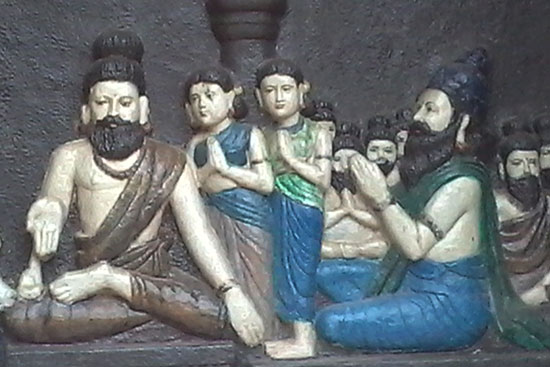At the heart of the Bhagavad Gita, amidst the profound dialogues between Arjuna and Krishna, the story of King Janaka emerges as a timeless testament to the harmonious convergence of worldly duties and spiritual aspirations. King Janaka, ruler of Mithila and renowned for his wisdom and integrity, embodies the ideal of a regal seeker who navigates the complexities of life while remaining firmly rooted in the pursuit of higher truths.
Janaka's tale intertwines with the larger narrative of the Gita, illustrating how the teachings imparted by Krishna resonate with the journey of this noble monarch. As Arjuna grapples with his own moral dilemmas on the battlefield of Kurukshetra, Krishna imparts profound wisdom that mirrors the path of King Janaka – a path of detached action and self-realization.
King Janaka's story is etched against the backdrop of a grand event – the "Sita Swayamvara." This royal assembly draws princes, warriors, and noble figures to Mithila, all vying for the hand of the virtuous princess Sita. Amidst this opulent spectacle, Janaka stands not just as a king but as a sage, embodying the spirit of impartiality, justice, and spiritual inquiry.
Janaka's qualities as a king are emblematic of "karma yoga," the path of selfless action. His administration exemplifies righteous governance, where he serves his kingdom with unwavering integrity and upholds dharma, the righteous path. The "Sita Swayamvara" exemplifies his commitment to justice, as he ensures that only the worthy suitor, Lord Rama, can string the divine bow and win Sita's hand.
However, Janaka's pursuits extend beyond his role as a sovereign. His interactions with the sage Ashtavakra unravel the depths of his spiritual quest. Ashtavakra's teachings guide Janaka toward a profound realization of the imperishable nature of the soul (atman), a truth that transcends the transient realm. Janaka evolves from a ruler with worldly responsibilities into a sage-king who embodies the essence of "jnana yoga," the path of knowledge.
The dialogue between Krishna and Arjuna mirrors Janaka's journey. Krishna imparts the wisdom of karma yoga, urging Arjuna to perform his duties selflessly, without attachment to the results. He emphasizes that the soul is eternal and indestructible, much like Janaka's realization of the imperishable atman. Arjuna, like Janaka, is reminded that the pursuit of righteousness transcends the material realm and leads to self-realization.
King Janaka's story serves as a radiant thread that weaves through the tapestry of the Bhagavad Gita, embodying the teachings that Krishna imparts to Arjuna. The narrative underscores the profound truth that the path of spiritual realization is not confined to renunciation but can be embraced while fulfilling one's worldly responsibilities.
In the dialogue between Krishna and Arjuna, we witness the convergence of principles that guided King Janaka's life – the pursuit of self-realization, righteous action, and detachment from outcomes. Janaka's story continues to inspire seekers across ages, reminding us that the pursuit of truth need not be divorced from the challenges of daily life. It beckons us to harmonize our roles as worldly participants and spiritual aspirants, echoing the wisdom that life itself is a canvas upon which we paint the strokes of dharma and self-discovery.
King Janaka was a legendary ruler of the ancient kingdom of Mithila, which is believed to be in present-day Nepal. He is renowned for his wisdom, spiritual insight, and his pursuit of truth and self-realization. Despite being a king, he lived a life of detachment and performed his duties with a sense of equanimity and selflessness.
One of the key episodes associated with King Janaka is his encounter with the sage Ashtavakra. The story goes that Ashtavakra was a young sage who had attained great spiritual knowledge and was known for his deformed physical appearance due to eight bends in his body. Ashtavakra heard of Janaka's reputation for wisdom and sought an audience with him.
During their conversation, Ashtavakra questioned Janaka about the nature of reality and liberation. Janaka, in response, displayed a remarkable level of spiritual insight and clarity. He demonstrated that despite being a king and engaged in worldly affairs, he had transcended attachment to the material world and had a deep understanding of the true nature of the self (Atman) and the ultimate reality (Brahman).
In the Bhagavad Gita, Lord Krishna uses King Janaka as an example of a "karma yogi" – someone who practices the path of selfless action. Krishna emphasizes the importance of performing one's duties without attachment to the results, just as Janaka ruled his kingdom and fulfilled his responsibilities without being swayed by success or failure.
The story of King Janaka illustrates the principle of "niskama karma," which means performing actions without selfish desires. This concept is a cornerstone of the teachings in the Bhagavad Gita. Janaka's life showcases how it is possible to remain engaged in worldly activities while maintaining a detached and spiritually attuned mindset.
The story serves as a powerful reminder of the potential for self-realization and spiritual growth within the context of everyday life. His example highlights the harmony between action and spiritual wisdom, and his character continues to inspire seekers on their quest for truth and self-discovery.

Looking for Something? Search Google :